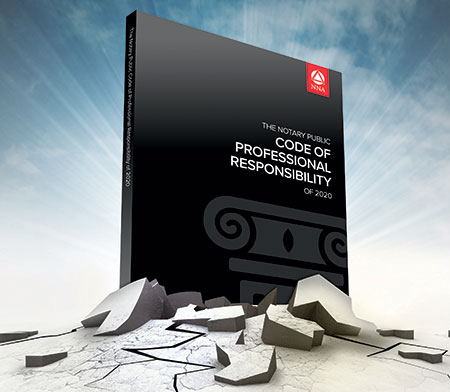 This is our last introductory commentary article on The Notary Public Code of Professional Responsibility of 2020. If you have read one or more articles in this series, that is just great! If we have said anything in this series that has prompted you to read the Code in part or whole, you are well on your way to mastering the message of the Code’s final Guiding Principle X.
This is our last introductory commentary article on The Notary Public Code of Professional Responsibility of 2020. If you have read one or more articles in this series, that is just great! If we have said anything in this series that has prompted you to read the Code in part or whole, you are well on your way to mastering the message of the Code’s final Guiding Principle X.
Guiding Principle X reads, “The Notary shall seek instruction on notarization, and keep current on the laws, official guidelines, and practice standards of the notarial office.”
We’ve learned over the years Notaries can have one of two attitudes regarding education — one and done and ongoing. You have the one and done attitude if you take a course solely to satisfy a state requirement to become a Notary or attend a class because your employer tells you to. Once you take the course, you’re done. You view Notary training as a one-time shot.
By contrast, if you embrace an ongoing attitude toward learning, you commit to continuing education for as long as you are a Notary. It should be no surprise the Code adopts the second attitude as the one to which all Notaries should aspire. Ongoing learning is necessary because Notary laws are constantly changing. In the average year, the NNA’s Notary Law Updates database records entries for approximately 50 new laws that take place across the country. In 2020, there have been 140. Notaries must keep abreast of all changes in the law that affect how they perform notarizations in their state.
The official guidelines of your state Notary commissioning or regulating official can change over time and you must keep current with them as well. State Notary handbooks, website FAQs, and periodic newsletters and correspondence from your commissioning official typically will contain these guidelines.
Finally, best Notary practices change over time, too. The Notary Public Code of Professional Responsibility was updated this year because in the 22 years since the original Code was released many practice standards had evolved. During this time, the NNA has written many articles on best Notary practices that you can find in our Knowledge Center. We’ve taught workshops on these practices at our annual conference and you can watch workshops from NNA 2020 Online for free. And, at least one new book covering Notary practice standards has been written. Some practice standards may not be in your state’s Notary statutes but they are as important to know and follow as any law for the reason that practice standards protect the public, the notarial act, and the Notary from legal challenges, litigation, and fraud.
In conclusion, what is your attitude toward learning as a Notary? Remember: as a Notary you are a public official who serves the needs of the individuals who come to you with their documents. When you look at being a Notary in this way, the question of attitude is framed in an entirely different light. The Code would have it no other way.
Bill Anderson is the NNA’s Vice President of Government Affairs and Drafting Coordinator for The Notary Public Code of Professional Responsibility of 2020.